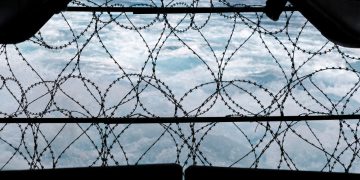A group of scientists and conservationists have been collaborating with Sea Shepherd in attempts to reduce as much ghost net as possible from the critical zones; In August they recorded the first vaquita sightings of 2019.
As the video explains, the participants had sightings of two pairs of Vaquitas on August 19th and 20th, then two Vaquitas were photographed when sighted on September 3rd.
Vaquita are the smallest cetaceans on the planet and the most endangered marine mammal on Earth. The species is endemic to Mexico’s Upper Gulf of California. It is estimated there are less than 19 vaquita alive today.
Specifically, the visual expedition is being conducted in the Upper Gulf of California, in a partnership between Mexico’s National Commission on Protected Areas (CONANP), Sea Shepherd Conservation Society and Museo de la Ballena y Ciencias del mar, along with leading marine mammal researchers from the Autonomous University of Baja California Sur (UABCS) and the USA, as well as support from the Mexican Navy.
Following the lead of CONANP and thanks to their tremendous monitoring efforts of the vaquita population, we have been able to find, film and photograph some of the last individuals
… commented Eva Hidalgo, Sea Shepherd’s Science Coordinator.
[smlsubform prepend=”GET THE SAFETY4SEA IN YOUR INBOX!” showname=false emailtxt=”” emailholder=”Enter your email address” showsubmit=true submittxt=”Submit” jsthanks=false thankyou=”Thank you for subscribing to our mailing list”]
Despite collaborating for many years in the acoustic monitoring efforts, it was the first time that the Sea Shepherd was present in a visual identification expedition to identify and document vaquita. Also, for five years now, Sea Shepherd has been present in the Gulf, collaborating with the Mexican authorities to protect these rare species.
Sea Shepherd first recorded a vaquita on April 18, 2015, just two days after Mexico had announced a strong plan of action to protect the vaquita porpoise, bringing the country to the forefront of conservation of endemic species.
Concluding, Sea Shepherd founder and CEO Captain Paul Watson stated
It is very important to document these live vaquitas. Our crews have been working tirelessly, day and night, to remove the gillnet threat from the vaquita’s path.
See also





























































